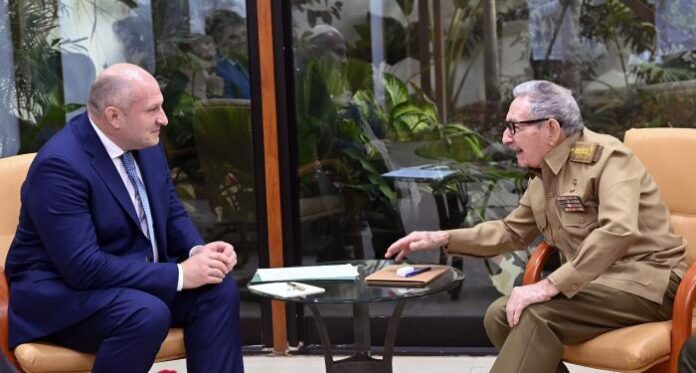
By Francisco Acevedo
HAVANA TIMES – Nearly two months after persistent rumors of his death, Raul Castro, the real decision-maker in Cuba, finally made a public appearance this week.
He made a brief appearance on September 27 to receive Chinese official Li Shulei, and now the he met with Lieutenant General Alexander Viacheslavovich Kurenkov, Russia’s Minister of Emergency Situations.
On this occasion, the 93-year-old Castro thanked the Russian government for its cooperation during emergencies, including donations technical assistance for firefighters and rescuers, as well as repairs to infrastructure damaged by natural disasters.
Recently, President Miguel Diaz-Canel also met with Russian Deputy Prime Minister Dmitry Chernyshenko, who announced a $65 million credit to address Cuba’s energy crisis.
At that time, agreements were signed for a $60 million loan to purchase fuel and a $2 million donation to repair the island’s electrical system. Efforts are also underway to restructure Cuba’s debt to allow for a payment deferral (the amounts remain undisclosed but are substantial) and to authorize transactions in rubles.
This return of Raul Castro to the public sphere seeks to quell growing rumors about his health. Although his presence has become increasingly limited, Castro continues to play a symbolic role in Cuba’s international relations, hosting high-ranking dignitaries from allied nations.
For Diaz-Canel, the acting president, it’s a great relief. As we’ve mentioned before, no one can imagine the chaos that might ensue in Cuba when the younger Castro, officially the Cuban president from 2008 to 2018, passes away, because the military leaders hold the true power in the country.
However, neither Castro nor Diaz Canel have addressed criticism regarding their handling of the crisis following the prolonged power outages, and the two hurricanes and earthquake that recently struck the island.
On social media, citizens have expressed discontent over the lack of resources to deal with flooding, prolonged blackouts, and water shortages, with some areas still without electricity.
Though Raul’s appearances remain increasingly sporadic (even during his presidency, his public outings were minimal), he shows a particular interest when it comes to Russia.
In February of this year, it was Castro —not Diaz-Canel— who presided over a meeting in Havana with Nikolai Patrushev, the secretary of Russia’s Security Council, and received Russian Interior Minister Vladimir Kolokoltsev alone during his visit to Cuba last November.
The “handpicked leader” (Diaz-Canel) primarily oversees matters related to Russian economic aid to the island. However, in areas presumed to involve deeper political discussions (specifically security topics), Castro dons his military uniform to make it clear that he is in control.
Since last year, the Cuban regime has been sending police and lawyers for training in Russia, as confirmed by Justice Minister Oscar Manuel Silvera Martínez during the recent International Legal Forum in St. Petersburg.
Putin’s Russia isn’t faring well in the international arena either, and an ally, even one as poor and vulnerable as Cuba, remains important.
Ultimately, the recent $60 million diesel gift won’t resolve Cuba’s deep energy crisis, which requires far more to address its structural problems.
Several Russian ships have docked at the Havana port in recent months: in July, the patrol ship Neustrashimy and an oil tanker arrived; in June, a group of Russian navy vessels, including a nuclear submarine, visited according to official reports. These arrivals went unnoticed by the general public, but they happened.
Four months ago, Kremlin military spokesman Alexander Sharkovsky publicly suggested that Russia could deploy nuclear weapons in Cuba, adding that a Russian military base was being re-established on the island. This comes after nearly all military infrastructure had been dismantled since the closure of the Soviet-era Lourdes intelligence base, now the University of Computer Sciences (UCI).
With Donald Trump recently elected as US president and Marco Rubio appointed Secretary of State, US policy toward Cuba may become harsher than during Trump’s first term. It appears that both Russian and Cuban leaders are preparing for this possibility.
Putin will likely try to avoid a direct confrontation with the unpredictable occupant of the White House, but just in case, he’s securing an ally geographically close to his old Cold War adversary.
As during the 1962 Missile Crisis, in this geopolitical chess game, we are mere pawns. It’s likely that Raul is trying not to fare as poorly as his brother Fidel did 50 years ago.
Domestically, Raul’s presence provides a sense of stability for Diaz-Canel, who is currently a convenient figure for those who wish to continue ruling from behind the scenes. As long as the 93-year-old remains in charge, Diaz-Canel’s position is secure, and he will continue to laugh at Raul’s jokes and bow his head when necessary.
Read more from Cuba here on Havana Times.




